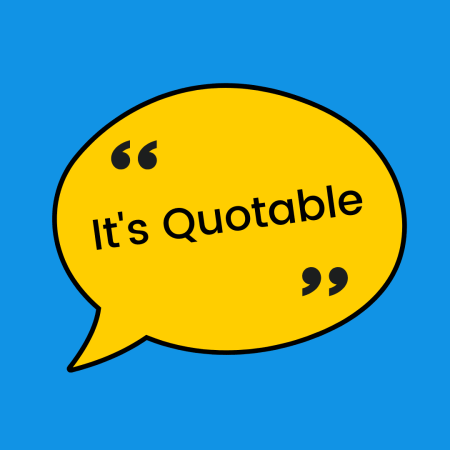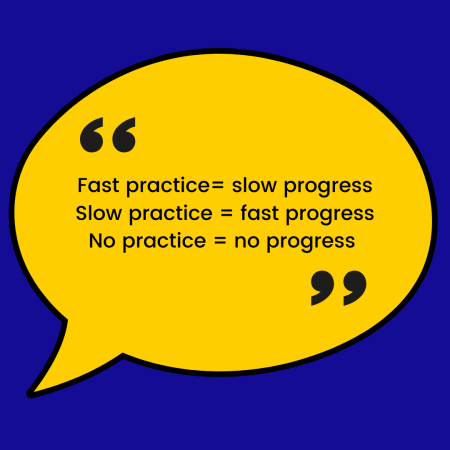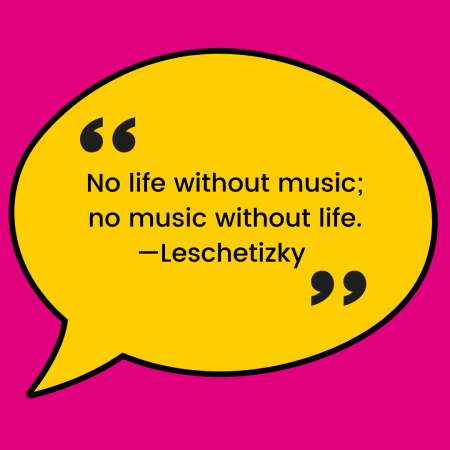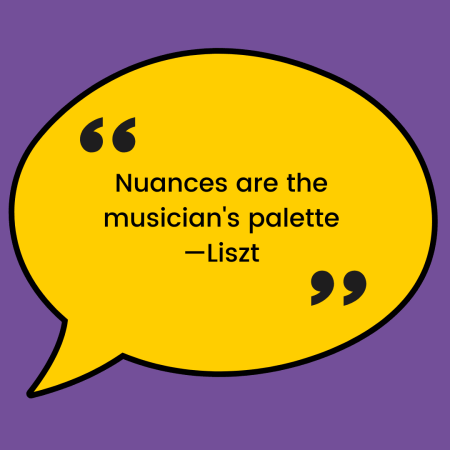The Best Music Quotes for Piano Teachers




When we use an impactful quote or saying, we are often able to pack a powerful insight into a very short space. This allows us to communicate with students more directly and provides a way for students to remember the information we are teaching. I can always tell when a maxim is getting the job done because a student will casually recite one back to me! Mission accomplished!
But, why keep all of this gold to ourselves? We wanted to compile some of our favorite piano pedagogy and music quotes in one place as a resource to teachers. We’ve discovered these over years of reading, going to conferences, and working with colleagues. Some of them even come from our own teachers.
We hope to continue adding to this list of music quotes for the piano teaching community. These are also great to share on social media—feel free to borrow! We’d love for you to let us know if you have a favorite quote that belongs on this list. Please contact us, and we’ll get it added! We’ve organized quotes by topic to help you more easily find what you need.
Quotes by Topic
- At least one hundred shades of sound can be extracted from the piano. It’s like a painter who gets an infinite variety of shades from one color.” —Carl Czerny
“Be aware of modulations and of the note that establishes the new key. One way of showing it is by leaning on it or with a little hesitation or accent. You must try to make the listener aware of everything that is on the score. Feel that everything is important!” —Rosina Lhevinne
Ruth Slenczynska’s quotes about phrasing “Let your left hand sing like a cellist.” “Don’t let the energy drop.” “Hold on to the line.”
“Nuances are the musician’s palette.” —Franz Liszt
“Works of art make rules; rules do not make works of art.” —Claude Debussy
“The music is not in the notes, but in the silence between.” —Wolfgang Amadeus Mozart
“We agreed that each phrase must have one high point—but as to where that point was, we often felt quite differently.” —Rosina and Josef Lhevinne
“Play as late as possible while still playing in time…play as late as possible without playing too late.” —Leon Fleisher
“Do you express the composer’s thoughts and mood? Do you express what you feel and wish? Whatever it is, by all means express something! —Rosina Lhevinne
What is it to be musical? You are musical if you have music not in your fingers only, but in your head and heart.” –Robert Schuman
“Bach is an astronomer, discovering the most marvelous stars. Beethoven challenges the universe. I only try to express the soul and the heart of man.” —Frédéric Chopin
“Bach is the beginning and end of all music.” –Max Reger
“Music can name the unnameable and communicate the unknowable.” —Leonard Bernstein
“Music is the divine way to tell beautiful, poetic things to the heart.” —Pablo Casals
“The easiest way to avoid wrong notes is never to open your mouth and sing. What a mistake that would be.” —Pete Seeger
“Musicians want to be the loud voice for so many quiet hearts.” —Billy Joel
“Life is like a piano. What you get out of it depends on how you play it.” —Thomas Lehrer
“One of the great beauties of music is that it is not mathematics, where ‘two and two’ is ‘four’ and ‘five’ is wrong.” —Josef Lhevinne
“I would teach children music, physics, and philosophy; but most importantly music, for the patterns in music and all the arts are the keys to learning.” –Plato
“You have to change the pedal or the notes will bite each other. You can’t keep the pedal down when you play descending scales. It begins to swim. It should bother you when it swims.” –Menahem Pressler
“The pedal is the breath of the piano. If it is done poorly, it’s as if it has asthma.” –Menahem Pressler
“That’s too much pedal. You practice so well and then you put on all that pedal. You have to go on a diet, a pedal diet!” –Menahem Pressler
“The pedal covers a multitude of sins.” –Von Bulow
“You must not use the una corda so much. It’s not like a pacifier. It makes the sound too dead, whispering, like you are talking under the breath.” –Menahem Pressler
“Pedal with your ears.” –unknown
“The Pedal is the soul of the piano.” —Anton Rubinstein
“There is no hard fast rule, each phrase is a law unto itself.” —Rosina Lhevinne on Pedaling
“The sun will come up, regardless of what the judges say.” –Skye Garcia
“Train hard and focus on what you can control.” –James Clear
“By failing to prepare, you are preparing to fail.” —Benjamin Franklin
“Fast practice, slow progress. Slow practice, fast progress. No practice, no progress.” —Fay Adams
“Don’t swim laps while daydreaming. Try to improve on each stroke.” —unknown
“A relationship is very much like practicing in that you can’t miss a day of nurturing it—like watering a plant. It always needs your attention” —Seymour Bernstein
“Your progress will be proportionate to the quality and quantity of effort expended.” —Seymour Bernstein
“If practicing fails, then the lessons fail.” —Philip Johnston, Practice Revolution
“The definition of insanity is doing the same thing over and over again and expecting different results.” —Albert Einstein
“Pure mistakes happen. What we do about them makes all the difference. Careless mistakes are ones we ignore and don’t pay attention to right away.” —Philip Johnston, Practice Revolution
“Practice at a tempo that is neither too slow nor beyond your present ability. Rather, choose a tempo that is only slightly faster than your ability to execute the passage perfectly. This faster tempo challenges you to concentrate to the fullest extent, thereby inducing your best efforts and, as is often the case, your best playing.” —Seymour Bernstein
Leschetizky on practicing excessively: “No one can do that without being mechanical, and that’s just what I’m NOT interested in. Two hours, or three at most, is all anyone should require if he will only listen to what he is playing and criticize every note.” —Leschetitzky
Rubinstein on practicing when other people are listening: “I couldn’t practice when anyone is around. You see, this is strictly ‘kitchen’ work. I must be alone. Because if anyone is around I don’t practice but I play. There is a grave difference.” —Arthur Rubinstein
“Everything fast is deserving of the same care as slow.” —Mona Rejino
Always practice using a “thinking tempo.” —unknown
“What I eventually learned from practicing is that if you don’t recognize problems and solve them, well, you just can’t learn to play the piano. However simple or obvious this may seem, its application has not only affected my musical progress, but my personal life as well.” —Seymour Bernstein
“There are many person who imagine all will be accomplished if they keep on spending many hours each day in mere mechanical practice. It is about as if one should busy himself with repeating the ABC as fast as possible and always faster and faster. Use your time better.” –Robert Schumann
“When you simply can’t try any harder, it’s time to find a different path.” —Greg McKewon
“By intense concentration, love of your work, and the spirit in which you approach it, you can do more in a half hour than in an hour spent purposelessly.” —Rosina Lhevinne
“Do not expect to affirm one’s teaching through student accomplishment.” —Jeanine Jacobson, Professional Piano Teaching Book 2
“I treat talented students as potential piano majors, even though they might choose a career other than music.” —Donald Morelock
“Teachers who decide to accept only talented students who may win competitions are going to be unhappy over a long period of time. Many happy teachers truly enjoy developing the potential in their students.” —Donald Morelock
“With a very good teacher, no printed method will be effective, and only he is a good teacher who can practically demonstrate every possibility to his pupils.” —Leschetizky
“Nothing develops hearing, sound palette, technique, and plasticity like polyphony.” –Heinrich Neuhaus
“The pianist has to have three support points: 1. sit bones 2. feet 3. fingertips. If one of these is missing, we cannot expect good sound quality.” –Leschetizky
“The wrist should take the hand to the next note.” –Leschetizky
“Evoke a fine tone from the instrument and make music, not noise. Technique is just a tool to produce a beautiful musical tone.” –Vengerova
“Immobile hand and stiff wrist produce an inexpressive sound.” —Boris Berman
“Many technical problems vanish instantly when musical feeling dictates the proper physical attitude. In short, the greater the musical confidence, the less the technical insecurity” –Seymour Bernstein
“The most perfect technique is that which is not noticed at all.” —Pablo Casals
“You must travel just so many scale miles and arpeggio miles and octave miles before you arrive at the musical dreamland of interesting execution and interpretation.” —Rosina Lhevinne
“In every piece written today or one hundred years ago, they [scales and arpeggios] are the principal means by which every passage and every melody is formed.” –Carl Czerny
“Making music should feel easy. If it doesn’t, then the underlying physical issues have not been solved. Period.” –Neil Stannard
“Many of life’s failures are people who did not realize how close they were to success when they gave up.” —Thomas Edison
“Imagination is more important than knowledge.” —Einstein
“I wasn’t through because I had had a succession of flops, and I wasn’t suddenly a different man or a better writer because I was on a wave of successes now. I wanted to remind everybody in the theater that success or failure is always just around the corner.” —Oscar Hammerstein
